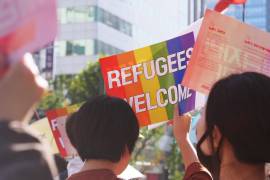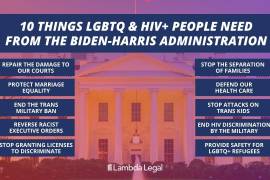
The Good, the Bad and the Ugly of President Obama’s Immigration Announcement for LGBT Communities
Blog Search
President Obama took some actions last night to improve our outdated immigration system. Here’s what these changes mean for you and for our country.
Let’s start with the ugly, and get it out of the way.
The President is providing a temporary way for some undocumented immigrants to work lawfully in the country, be protected against deportation, and pay taxes going forward. That’s the deferred action program. But it’s only for parents of children who are U.S. citizens or lawful permanent residents (LPRs). And while more than 4 million undocumented immigrants are expected to benefit from the program, the ugly part is that it is just not sensitive to the reality of LGBT people’s lives.
LGBT people face huge barriers when creating families, including expensive assisted reproduction and antigay adoption laws. Some came as adults in order to support the children they left behind and others fled anti-LGBT persecution in their country of origin, so the fear of being deported makes family planning all the more difficult. Not to mention that not every state allows same-sex couples to marry and many couples want to raise a child under the protections afforded by marriage.
Also, the program needs more flexible eligibility requirements that reflect the unique circumstances of many in the LGBT community. Some undocumented LGBT immigrants have convictions—oftentimes felonies—due to unreasonable HIV criminalization laws or for survival crimes such as sex work. This problem is particularly acute in the transgender community. Participation in the street economy often stems from persecution, abuse and lack of stable housing and income. Many undocumented LGBT individuals have no choice but to turn to survival crimes to provide the basic necessities for their families.
Together, these requirements disproportionately affect LGBT undocumented immigrants, especially those with low incomes. Instead, we need a plan that recognizes community ties and longtime residency, criteria that can accurately assess the contributions of LGBT undocumented immigrants. That is what we will continue to advocate for.
The Good
The best part is that the President finally took action based on his legal authority to improve the current system, including additional administrative changes that will indeed benefit LGBT communities. Some LGBT people will meet the new criteria announced by the President and will be among the approximately 4 million people helped by these new policies.
For this population, there are issues about which to be cautious: For those who are one of more than 4 million parents of U.S. citizens and LPRs, they must also have been in the country for more than 5 years and pass a background check in order to apply. Applications will begin in spring and there will be a fee. We urge people to beware of people overpromising immediate immigration benefits (for example notaries public, notarios públicos in Spanish). Not everyone will qualify for the program, especially those who have prior criminal convictions or past deportations.
Expanded options for victims of human trafficking (T visas) and other crimes (U visas) will become available. Changes to the way local police and immigration officials collaborate should mean that immigrant communities will not think twice about calling the police for fear of deportation. If you were brought to the U.S. as a child, you may be able to qualify for deferred action now that the age limit will be removed.
More LGBT undocumented immigrants who are spouses and children (including adult children) of U.S. citizens and LPRs will be able to apply for provisional waivers that allow them to stay in the country, with their family, while their case is processed. This will help married binational same-sex couples if the foreign national was in the U.S. unlawfully for more than six months. People in such cases need to apply for an “extreme hardship” waiver to avoid being barred from returning to the U.S. for three or 10 years. Consideration of family ties, conditions in the country of removal, and length of residence in the U.S., among other factors, may mean more LGBT undocumented immigrants will secure the waiver. Finally, if you are already in detention, your deportation case may get closed if your case is considered low-priority.
With greater awareness and advocacy, a few changes will also help documented LGBT immigrants. The President is creating a Task Force on New Americans to create a federal strategy on immigrant integration. LGBT immigrants need to be taken into account there. And expanded options for paying for naturalization fees means more LGBT LPRs will be able to become citizens.
The Bad
Even if you qualify for deferred action, you will not be able to access Obamacare or the insurance marketplace directly, which from a public health standpoint doesn’t make sense. Policies like this negatively affect HIV-prevention efforts and the health and wellbeing of the entire community.
Also, streamlining the immigration court process could reduce backlogs, but they can also further compound the injustice of a faulty system that already plays fast and loose with due process.
The worst part is that all the good changes are temporary and can be changed by a future administration. Hopefully, this will motivate Congress to act, because we need a permanent fix – a comprehensive immigration reform bill will be fair for the country and all 11 million undocumented immigrants, including more than 267,000 LGBT people.
As they say, the devil is in the details. Depending on how these changes are implemented, LGBT immigrants may face additional obstacles. Contact Lambda Legal’s Help Desk if you feel you are being treated unfairly because of your sexual orientation, gender identity or HIV status. Continue to look for more resources. Immigration law is complicated—know your options and be well informed.




